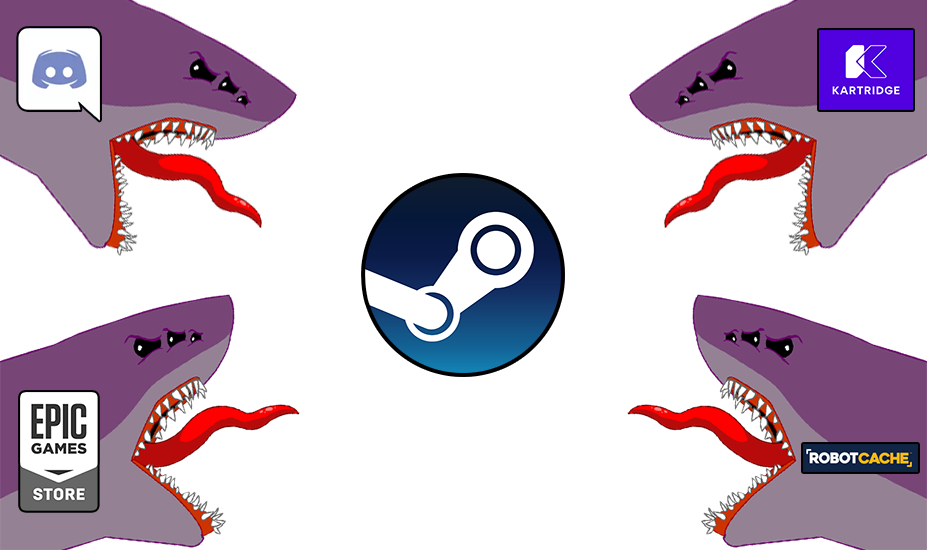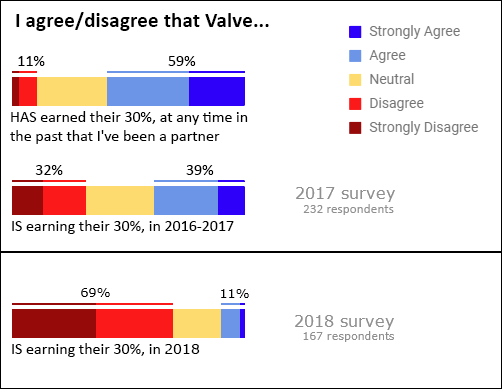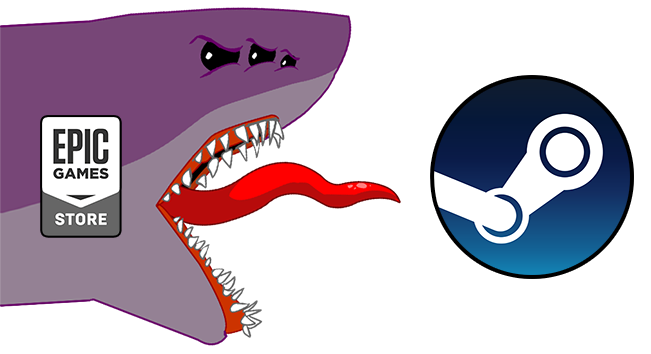
Almost exactly one year ago I wrote an article about how crazy it is to try to compete with Steam (So You Want To Compete With Steam). If you haven't read that yet, give it a quick skim.
Competing head-on with an entrenched market leader is called Red Ocean strategy, because it's like a feeding frenzy of sharks all tearing each other apart to get at the same piece meat.
Now, I'm not saying nobody should compete against Steam. What I am saying is that taking on the top shark is fraught with peril, and nearly every company that's tried so far has repeated the same fatal mistakes. Steam has reigned supreme for over 15 years for a reason, but recent rumblings suggest things are about to change:
My third annual developer survey suggests that developer support for Valve's 30% share just hit an all time low; this sentiment is consistent regardless of developer size, wealth, and geographic location.

AAA publishers including Activision, Ubisoft, and Bethesda have followed in the footsteps of EA's Origin and Blizzard's Battle.net* in withholding their content from Steam in favor of platforms where they have more control.
*Yes I know Activision and Blizzard are part of the same company. My point is Blizzard games have always been exclusive to Battle.net, but now we're starting to see Activision titles there as well.
There are no less than four new challengers, three of which have already launched preliminary versions of their stores.
The new challengers are:
Some quick personal disclosures:
Level Up Labs' co-founder Anthony Pecorella works at Kongregate full-time while I run things at LUL day-to-day. I'm not affiliated with/employed by Kongregate, nor do they own any stake in our company.
I have friends and contacts that work at Epic, Kartridge, Itch.io, GOG, and Steam, including multiple CEO's and founders.
I interviewed with Valve once but didn't land a full-time position.
I've contracted on and off for Valve for small projects like e.g. Steam Input documentation but I'm not employed by them in any capacity right now.
I'm first and foremost a game developer, so it's in my direct financial interest to egg all these companies on to compete for developer affections.
Each of these obviously biases me. Rather than feigning neutrality or doubling down on my own opinion, I'm trying to make my biases as transparent as possible here, and in my analysis below I'll do my best to consider things from perspectives other than my own.
With that out of the way, let's take these four stores through their paces and see if they've learned from those who have tried and failed before.
Object of the Game
In American Football, you don't win by gaining yards, you win by scoring points, even if yards are how you get there. In the games business, victory points are measured in terms of sales and customers.
Here's a list of fun things that shouldn't be confused with victory points:
Winning PR slapfights on social media
Getting lots of positive press
Registering fifty bajillion non-paying user accounts
Spending lots of money
These accomplishments can all be part of a balanced winning-the-game breakfast, but don't brag about your yards until you've made the touchdowns, is all I'm saying.
Okay, so you need to sell some games. That means you need developers and publishers to sign up so you can have something to sell, and then you need customers to show up and buy those games. Trouble is, these groups don't want the same things.
As I said in Stores vs. Developers vs. Customers vs. Publishers, it's far too easy for "analysts" like me to elevate one stakeholder's viewpoint above all others. In my social media bubble, the default point of view is that of developers, particularly indies. There's nothing wrong with this particular perspective, but you're here because you want to compete with Steam, and that means balancing all parties' interests while still looking out for your own. The blinders have to come off.
Therefore, one criterion for judging each of the new "Steam Competitors" is how well they appeal to each stakeholder group, not just to me as an individual.
Meet the contestants
Epic Games

The Epic Games Store is backed by Epic Games, developer of not only the mega-hit Fortnite, but also a long string of hits stretching back decades, from the more recent Gears of War and Unreal series, all the way back to Jazz Jackrabbit and


































